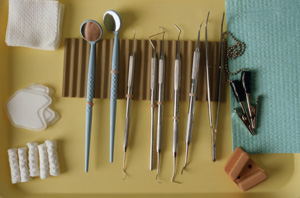
Materials that are regularly used in dentistry can stress an already weakened immune system to the point of irreversible damage.
by Dr. Nicholas Meyer —
Near the beginning of the last century, dentistry and medicine took somewhat separate paths. The view that the teeth were somehow isolated from the rest of the body permeated the minds of generations. It was, however, and is still acknowledged, that you can die from a tooth infection, but along came root canal therapy and antibiotics. Thus, the notion that tooth infections were synonymous with death seemingly ceased. At about the same time, the only filling materials were mercury amalgams or the more technically demanding gold foil or cast gold.
A small group of dentists were able to prevail in the late 1800s, and the widespread use of mercury came into being, as it allowed them to inexpensively fix teeth. This was counter to what other doctors believed — that mercury materials should not be placed in the body. Those dentists who advocated mercury fillings went on to form what is currently the American Dental Association.
We have, in the United States, become a sicker people. As the population has become less healthy, the ability to withstand many of the various materials used in dentistry has waned. Sadly, injured immune systems are prevalent today.
Materials that are regularly used in dentistry can stress an already weakened immune system to the point of irreversible damage. To help counter this assault, tests are available that help determine which dental filling materials (and others) will be the least challenging to the immune system. One such test is called a serum compatibility test.
Another form of testing can simply be referred to as a resonance test. Many practitioners can perform this test and help you select materials that are more health supportive. There are no specific materials that work to support the immune system, universally, as every human being is different, yet some type of testing is imperative to maintain or enhance your health and well-being.
Nicholas Meyer, D.D.S., D.N.M., is a general dentist in Scottsdale, Ariz., who has a special interest in developmental disturbances of the facial complex that contribute to such maladies as TMJ, snoring and sleep apnea. www.milldental.com, DrMeyer@milldental.com or 480-948-0560.
Reprinted from AzNetNews, Volume 31, Number 2, April/May 2012.





April 12, 2012
Dental, Health